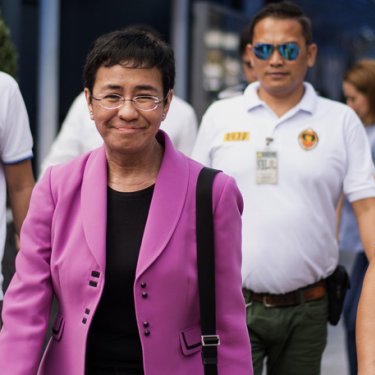Philippine government brings two new complaints against Rappler

Reporters Without Borders (RSF) calls on the Philippine authorities to stop hounding the Rappler news website, after officials yesterday confirmed that a previously dismissed defamation action against Rappler has been revived and last week brought a tax evasion complaint against the site.
All this would be laughable if the site’s survival were not at stake. The National Bureau of Investigation (NBI), the entity responsible for ordering judicial investigations, tried unconvincingly yesterday to explain its decision to revive a defamation complaint that, according to an NBI official on 22 February, had been closed because there was “no basis.” The information that the case had been dropped was a “premature disclosure,” the head of the NBI said yesterday.
The Bureau of Internal Revenues (BIR), a finance ministry offshoot, meanwhile announced on 8 March that it has filed a complaint accusing Rappler of evading 133.86 million pesos (2.5 million dollars) in taxes. No credible audit was produced to justify this extraordinary sum and Rappler editor Maria Ressa described the complaint as “ludicrous.”
“The behaviour of these various government agencies towards Rappler are tantamount to persecution,” said Daniel Bastard, the head of RSF’s Asia-Pacific desk. “We call on international bodies to step up their pressure on the Philippine authorities for an end to this offensive against media freedom. At the same time, we hail the complete transparency of Rappler, which is the best weapon against these crude manoeuvres by President Rodrigo Duterte’s government.”
No let-up in harassment
President Duterte’s declared war on Rappler was stepped up in January when the Securities and Exchange Commission (SEC) announced that it was revoking the website’s licence on the grounds that it was not 100% Philippine-owned. The site has appealed against this decision on the grounds that its sources of foreign funding have no shares in the company and therefore no decision-making power.
Omidyar Network, the philanthropic investment firm that is Rappler’s main source of foreign funding, announced last month that it was donating its Philippine Depositary Receipts (PDRs) to 14 Philippine managers of Rappler in order to ensure that the SEC had absolutely no grounds for its “unwarranted ruling.”
It was this move by Omidyar Network that accounts for the defamation and tax evasion complaints of the past few days. The authorities needed new ways to keep hounding Rappler.
What with the Office of the Solicitor General and the Department of Justice, a total of five government entities are now bringing pressure to bear on a media outlet that has made a name for itself with its investigative coverage of government corruption and abuses.
“Grave concern”
Despite Rappler’s defensive measures, Duterte has used these attacks to obstruct the activities of the website’s reporters. Pia Ranada has been denied access to the Malacañang presidential palace since last month although she is Rappler’s accredited Malacañang correspondent.
After RSF referred the issue to the United Nations in January, three UN special rapporteurs said they were “gravely concerned” about the government’s attempts to shut down Rappler. By way of response, President Duarte referred to UN human rights experts last weekend as “sons of bitches” and said they should be fed to crocodiles.
RSF is conducting a thorough survey of media ownership in the Philippines, which is ranked 127th out of 180 countries in the 2017 World Press Freedom Index.



